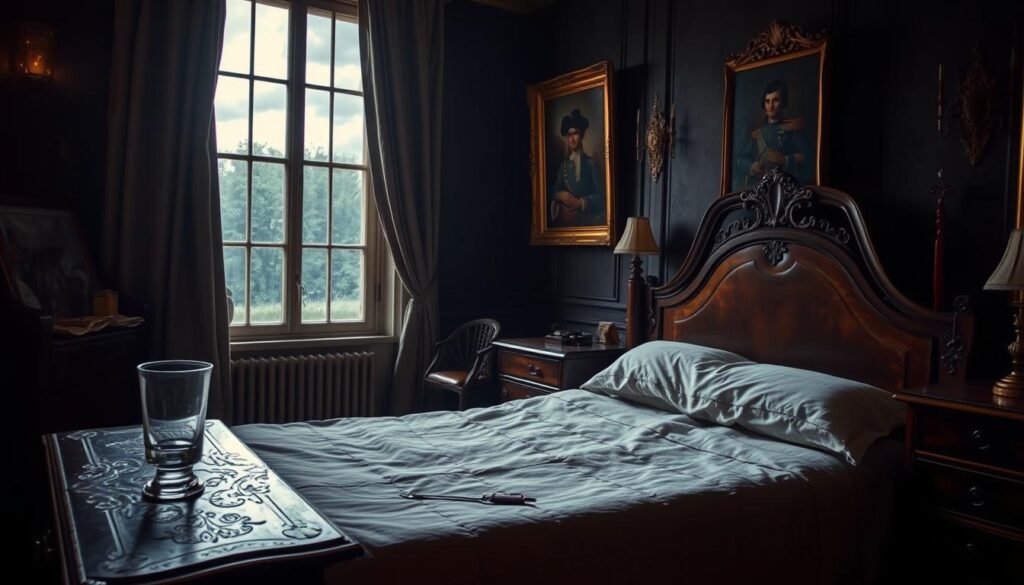Napoleon’s Final Chapter: The Intriguing Story of His Passing
Napoleon Bonaparte’s life was marked by significant events that shaped European history, and his death remains a topic of interest, with many wondering how did napoleon die. The napoleon bonaparte cause of death has been debated among historians, sparking curiosity about the circumstances surrounding his passing.
Understanding the life and death of Napoleon Bonaparte provides valuable insights into the historical context of his time, including the impact of his leadership on France and Europe. The significance of his death extends beyond the historical record, as it has influenced the course of European history.
The story of Napoleon’s final days is complex, with various theories emerging about the events leading up to his death. As we delve into the life and death of Napoleon Bonaparte, we will explore the controversies and mysteries surrounding his passing, including the question of how did napoleon die and the napoleon bonaparte cause of death.
Key Takeaways
- Napoleon Bonaparte’s death remains a topic of interest and debate among historians.
- The napoleon bonaparte cause of death has been the subject of various theories and discussions.
- Understanding the life and death of Napoleon provides valuable insights into European history.
- The significance of his death extends beyond the historical record, influencing the course of European history.
- The story of Napoleon’s final days is complex, with various theories emerging about the events leading up to his death.
The Life of Napoleon Bonaparte before His Death
Napoleon Bonaparte’s journey began on August 15, 1769, on the island of Corsica. His early education at military academies laid the foundation for his exceptional strategic skills.
Early Life and Military Successes
Showing remarkable talent, Napoleon quickly rose through the military ranks. His victories in the Italian Campaign and the Battle of Austerlitz established him as a formidable leader.
Rise to Power in France
Leveraging his military prowess, Napoleon seized political power in 1799. He became the First Consul and later crowned himself Emperor in 1804, reshaping the French government.
Key Achievements as Emperor
As Emperor, Napoleon implemented the Napoleonic Code, which influenced legal systems worldwide. His efforts in modernizing education and infrastructure left a lasting impact on Europe.
| Achievement | Description |
|---|---|
| Napoleonic Code | Unified French laws, emphasizing clarity and equality before the law. |
| Educational Reforms | Established lycees to standardize secondary education across France. |
| Infrastructure Development | Improved roads, bridges, and public buildings, fostering economic growth. |
The Exile of Napoleon: Elba to Saint Helena
After his initial defeat, Napoleon was exiled to the island of Elba. Life there was relatively comfortable, allowing him to engage in local politics and maintain a small court.
The First Exile: Life on Elba
On Elba, Napoleon enjoyed a degree of freedom. He implemented reforms and interacted with the island’s inhabitants, but the isolation weighed on him.
The Hundred Days: Return to Power
Driven by ambition, Napoleon escaped from Elba in 1815, returning to France for the Hundred Days. His brief resurgence ended at the Battle of Waterloo, leading to his second exile.
Final Exile: The Journey to Saint Helena
Napoleon was transported to Saint Helena, a remote island in the South Atlantic. Confinement here was strict, limiting his movements and interactions. The harsh conditions and isolation on Saint Helena are believed to have contributed to the demise of Napoleon and the death of Napoleon Bonaparte in 1821.
The Circumstances Surrounding His Death
Napoleon Bonaparte’s final days were spent in relative isolation on the island of Saint Helena. His health began to wane, leading to various accounts that contribute to napoleon’s death mystery.
The Time and Place of His Passing
Napoleon passed away on May 5, 1821, at approximately 10 p.m. in Longwood House, his residence on Saint Helena. The island’s remote location was intended to prevent his escape and return to power, ensuring his final days were confined to this secluded environment.
Witnesses and Accounts of His Death
Several close companions and his personal physician were present during Napoleon’s last moments. Dr. Francesco Antommarchi provided detailed observations of Napoleon’s declining health, noting symptoms that have fueled speculation over the years. These firsthand accounts are central to understanding napoleon’s death mystery.
| Date | Time | Location | Witnesses |
|---|---|---|---|
| May 5, 1821 | 10:00 PM | Longwood House, Saint Helena | Dr. Francesco Antommarchi, General Gourgaud |
Theories About Napoleon’s Health
Napoleon Bonaparte’s health has been a subject of debate among historians. Understanding the facts about Napoleon’s death requires examining his medical history and the conditions during his exile.
A Brief History of His Illnesses
Throughout his life, Napoleon faced various health issues. He suffered from stomach pains, which some believe were linked to a gastric ulcer. Additionally, records indicate he experienced headaches and respiratory problems, possibly stemming from his stressful military campaigns.
Possible Causes of His Declining Health
While in exile on Saint Helena, several factors may have contributed to his declining health. The island’s harsh climate and limited medical care played significant roles. His diet, reportedly poor in quality, could have exacerbated his ailments. Moreover, long-term stress and possible pre-existing conditions might have weakened his immune system.

| Illness | Description | Potential Impact |
|---|---|---|
| Gastric Ulcer | Chronic stomach pain and discomfort | Possible link to his death |
| Respiratory Issues | Frequent headaches and breathing problems | Weakened overall health |
| Stress | High levels of stress due to exile | Compromised immune system |
The Controversial Autopsy of Napoleon
The autopsy of Napoleon Bonaparte remains a subject of intense scrutiny, offering crucial details on Napoleon’s death. Conducted shortly after his passing, the examination sought to uncover the napoleon bonaparte cause of death.
Who Conducted the Autopsy?
The autopsy was performed by a team led by Dr. Francesco Antommarchi, Napoleon’s personal physician, along with British medical experts. This collaboration aimed to ensure an unbiased assessment amidst geopolitical tensions.
Key Findings from the Autopsy Report
The report revealed several notable observations:
- Enlarged liver
- Stomach ulcers
- Evidence of chronic gastritis
These findings have fueled debates about whether Napoleon’s death was due to natural causes or influenced by external factors. Some historians argue that the presence of arsenic points to possible poisoning, while others attribute his decline to long-term health issues.
| Organ | Condition |
|---|---|
| Liver | Enlarged |
| Stomach | Ulcers and chronic gastritis |
| Blood | High levels of arsenic detected |
The details on Napoleon’s death continue to be a topic of research, offering insights into the complexities surrounding his final days.
The Poisoning Theory: Fact or Fiction?
The demise of Napoleon Bonaparte has long been a subject of debate among historians. A significant theory suggests that his death was not due to natural causes but rather poisoning, adding a layer of mystery to the historical account of Napoleon’s passing.
Overview of the Poisoning Claims
Proponents of the poisoning theory argue that Napoleon was deliberately administered toxic substances to accelerate his demise. They point to symptoms reported during his final days, such as severe stomach pain and vomiting, which they believe align with arsenic poisoning.
Evidence Supporting or Debunking the Theory
Supporters cite the presence of elevated arsenic levels in his hair samples as scientific proof. However, skeptics argue that arsenic was commonly used in various products during that era, making it difficult to conclude deliberate poisoning. Additionally, some historians believe his declining health was due to other factors, such as stress and poor living conditions on Saint Helena.
| Aspect | Supporting Poisoning Theory | Counterarguments |
|---|---|---|
| Symptoms | Consistent with arsenic poisoning | Could be due to natural illness |
| Scientific Evidence | High arsenic levels found | Arsenic was widespread in the environment |
| Historical Context | Possible motives from rivals | Lack of concrete proof |
Napoleon’s Last Days: Personal Life and Reflections
In the twilight of his life, Napoleon Bonaparte found solace in his personal relationships and introspections. Surrounded by a close-knit group, he maintained deep connections despite his isolation.
Relationships with Family and Friends
Napoleon cherished his familial bonds, often writing letters to his relatives to stay connected. Friends who remained loyal provided companionship, easing the loneliness that came with his final exile. These interactions revealed a softer side of the formidable emperor.
His Thoughts on Legacy and Leadership
During the death of Napoleon Bonaparte, he frequently reflected on his achievements and the impact of his leadership. He expressed hopes that future generations would remember his contributions to Europe’s restructuring. His memoirs captured his desire to be seen as a visionary leader who sought to bring stability and progress.
| Date | Event | Reflection |
|---|---|---|
| May 1821 | Final Illness Diagnosed | Concern over his health impacting his thoughts on legacy. |
| June 1821 | Last Conversations with Family | Expressions of hope for his family’s future. |
| August 1821 | Passing Away | Final reflections on his life and leadership. |
Historical Reactions to Napoleon’s Death
The news of Napoleon’s passing sent ripples through Europe, igniting a spectrum of emotions and political responses. Understanding these reactions sheds light on the tumultuous period following his death.
Immediate Reactions in France
In France, the reaction was a mix of sorrow and relief. Supporters mourned the loss of a leader who had shaped the nation, while royalists welcomed the end of his influence. Public ceremonies were held to honor his legacy, reflecting the deep divide in French society.
Responses Across Europe
Across the continent, European governments reacted with caution and strategic recalibration. Countries that had opposed Napoleon saw his death as an opportunity to stabilize regional power dynamics. Diplomatic relations were reassessed, leading to shifts in alliances and treaties.

These immediate and widespread reactions highlight the significant impact of Napoleon’s death mystery and the enduring facts about Napoleon’s death on European history.
The Impact of Napoleon’s Death on France
Napoleon’s passing marked a significant turning point in France’s political landscape. His death raised questions about the future direction of the nation and led to profound changes in governance.
Political Changes Following His Passing
With Napoleon gone, the Bourbon monarchy was restored, re-establishing traditional royal authority. This period saw a shift away from the revolutionary ideals that Napoleon had championed. Additionally, Bonapartism emerged as a political movement, aiming to continue Napoleon’s legacy. Napoleonic principles, such as merit-based advancement and centralized administration, continued to influence French politics long after his death.
Influence on Future Leaders
Napoleon’s legacy deeply influenced future French leaders, including his nephew, Napoleon III. The ideals and strategies he employed became a blueprint for leadership and policy-making. Napoleon III, for instance, sought to modernize France’s infrastructure and strengthen its economy, drawing inspiration from his uncle’s achievements.
| Political Change | Description |
|---|---|
| Bourbon Restoration | Re-establishment of the monarchy under Louis XVIII, returning to pre-revolutionary governance structures. |
| Rise of Bonapartism | A political movement seeking to preserve Napoleon’s legacy and principles in French politics. |
| Influence on Future Leaders | Leaders like Napoleon III adopted Napoleonic ideals to shape their policies and leadership styles. |
The Legacy of Napoleon Bonaparte
Napoleon Bonaparte’s influence extends far beyond his lifetime. His reforms reshaped European society in enduring ways.
How He Changed Europe Forever
Napoleon introduced the Napoleonic Code, which streamlined legal systems and promoted civil liberties. His emphasis on meritocracy transformed educational institutions, making them more accessible. Militarily, he revolutionized army organization and tactics, setting standards still studied today. These changes provided a foundation for modern European states.
The Preservation of His Memory
Napoleon’s legacy is preserved through numerous monuments and museums across Europe. The Les Invalides in Paris houses his tomb, attracting millions of visitors annually. Additionally, historical sites like the Château de Malmaison and the Wellington Arch commemorate his life and death. These efforts ensure that the details on Napoleon’s death and the historical account of Napoleon’s passing remain integral to public memory.
| Aspect | Impact |
|---|---|
| Legal Systems | Implemented the Napoleonic Code, influencing civil law worldwide. |
| Education | Established institutions based on merit, expanding educational access. |
| Military Strategy | Developed advanced tactics and organization still taught today. |
| Monuments & Museums | Preserved his legacy through sites like Les Invalides and Château de Malmaison. |
Cultural Representations of Napoleon’s Death
The demise of Napoleon has been a rich source of inspiration across various cultural mediums. Artists and writers have long been fascinated by the death of Napoleon Bonaparte, using it to explore themes of power, legacy, and mortality.
Literature and Art Inspired by His Life
Many literary works delve into the circumstances surrounding the death of Napoleon Bonaparte. Novels and biographies often portray his final days with a focus on his strategic mind and personal struggles. In art, painters have captured emotional scenes depicting his last moments, highlighting the dramatic end to his reign.
Napoleon in Modern Media
Modern films and television series frequently revisit the demise of Napoleon, offering new interpretations of his character and legacy. These portrayals help shape public perception, making the story of the death of Napoleon Bonaparte accessible to contemporary audiences through compelling narratives and visual storytelling.
“Napoleon’s death remains a captivating chapter in history, inspiring countless artistic interpretations.” – Historian Emily Richards
| Medium | Work | Representation of Demise |
|---|---|---|
| Literature | “Napoleon: A Life” by Andrew Roberts | Detailed account of his final years and death |
| Art | “The Death of Napoleon” by Jean-Auguste-Dominique Ingres | Emotive portrayal of his last moments |
| Film | “Napoleon” directed by Ridley Scott | Explores his reflections leading to his death |
Conclusion: What We Learn from Napoleon’s End
Napoleon’s final days remain a subject of fascination, shedding light on his complex character and the turbulent times he lived in. The mystery surrounding napoleon’s death continues to captivate historians and enthusiasts alike.
Reflecting on His Life and Impact
Napoleon’s leadership and strategic brilliance significantly altered the course of European history. His military campaigns and administrative reforms left a lasting legacy that influenced future generations of leaders and shaped the modern state.
Lessons for Future Generations
From napoleon’s rise to his ultimate demise, we learn valuable lessons about ambition, resilience, and the consequences of absolute power. Understanding napoleon’s death mystery also reminds us of the importance of scrutinizing historical narratives and seeking the truth behind influential figures.














Post Comment